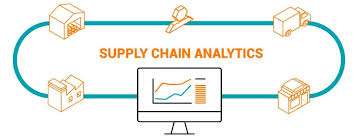Supply Chain Analytics Market Overview
The supply chain analytics market has seen exponential growth over the past decade, driven by the increasing complexity of global supply chains and the demand for enhanced efficiency and resilience. Supply chain analytics involves the application of data analysis and statistical techniques to the entire supply chain process to optimize decision-making, enhance operational efficiency, and mitigate risks. The integration of advanced technologies such as artificial intelligence (AI), machine learning (ML), and big data analytics has revolutionized this field, providing deeper insights and predictive capabilities.
Supply Chain Analytics Market is projected to grow from USD 5.48 Billion in 2024 to USD 16.7 billion by 2032, exhibiting a compound annual growth rate (CAGR) of 14.93% during the forecast period (2024 - 2032). This growth is attributed to the rising need for improved supply chain visibility, the adoption of IoT (Internet of Things) devices, and the increasing importance of risk management in supply chain operations.
Request To Free Sample of This Strategic Report - https://www.marketresearchfuture.com/sample_request/5512
Key Market Segments
By Component
-
Software: Encompasses platforms and tools for data collection, processing, and analysis. This segment is witnessing substantial growth due to the increasing need for real-time data analysis.
-
Services: Includes consulting, implementation, and support services. As companies adopt supply chain analytics, the demand for expertise to integrate and maintain these solutions rises.
By Deployment Mode
-
On-Premise: Preferred by organizations with stringent data security policies and those requiring significant customization.
-
Cloud-Based: Growing rapidly due to its scalability, cost-effectiveness, and ease of access from any location.
By Enterprise Size
-
Large Enterprises: Major adopters due to their extensive and complex supply chains requiring sophisticated analytics solutions.
-
Small and Medium Enterprises (SMEs): Increasing adoption driven by the affordability of cloud-based solutions and the need for competitive advantage.
By Industry Vertical
-
Retail and Consumer Goods: Utilizes analytics for demand forecasting, inventory optimization, and customer insights.
-
Manufacturing: Focuses on production planning, supplier performance, and quality control.
-
Healthcare and Pharmaceuticals: Employs analytics for managing the supply chain of critical medical supplies and pharmaceuticals.
-
Transportation and Logistics: Uses analytics for route optimization, fleet management, and delivery performance tracking.
Industry Latest News
The supply chain analytics market is buzzing with activity, as companies continuously innovate and adapt to changing market dynamics.
-
AI and ML Integration: Recent developments highlight the increasing integration of AI and ML in supply chain analytics. These technologies are enhancing predictive analytics capabilities, enabling more accurate demand forecasting and risk assessment.
-
Blockchain Technology: The adoption of blockchain in supply chain analytics is on the rise. It offers transparency, traceability, and security, making it a valuable tool for ensuring the integrity of supply chain data.
-
Sustainability Initiatives: Companies are increasingly focusing on sustainability in their supply chains. Analytics solutions are being used to track and reduce carbon footprints, manage waste, and ensure compliance with environmental regulations.
-
Resilient Supply Chains: In response to recent global disruptions, there is a strong emphasis on building resilient supply chains. Analytics play a crucial role in identifying vulnerabilities and developing strategies to mitigate them.
Key Companies
Several key players dominate the supply chain analytics market, offering innovative solutions and driving market growth.
-
IBM Corporation: Known for its advanced analytics and AI capabilities, IBM offers comprehensive supply chain solutions that enhance visibility and efficiency.
-
SAP SE: A leader in enterprise software, SAP provides integrated supply chain management solutions that leverage advanced analytics and IoT.
-
Oracle Corporation: Offers a robust suite of supply chain management solutions powered by AI and ML, focusing on improving decision-making and operational efficiency.
-
SAS Institute Inc.: Specializes in analytics software and solutions, SAS provides powerful tools for supply chain optimization and risk management.
-
Microsoft Corporation: Through its Azure cloud platform, Microsoft offers scalable and flexible supply chain analytics solutions that integrate with various data sources.
Market Drivers
Several factors are driving the growth of the supply chain analytics market:
-
Need for Supply Chain Visibility: Organizations require real-time visibility into their supply chains to respond quickly to disruptions and demand changes. Analytics provide this visibility, enabling proactive management.
-
Technological Advancements: Innovations in AI, ML, and big data analytics are enhancing the capabilities of supply chain solutions, making them more effective and accessible.
-
Globalization: The increasing complexity of global supply chains necessitates advanced analytics to manage diverse and dispersed operations efficiently.
-
Risk Management: The volatility of global markets, geopolitical tensions, and natural disasters have highlighted the need for robust risk management strategies. Supply chain analytics help identify and mitigate these risks.
-
Customer Expectations: Rising consumer expectations for faster delivery and better service are pushing companies to optimize their supply chains using analytics.
Ask for Customization - https://www.marketresearchfuture.com/ask_for_customize/5512
Regional Insights
North America
North America is the leading market for supply chain analytics, driven by the presence of major technology companies and high adoption rates of advanced technologies. The region's focus on innovation and efficiency is fostering market growth. The U.S., in particular, is a significant contributor, with many large enterprises investing heavily in analytics solutions.
Europe
Europe is experiencing substantial growth in the supply chain analytics market, with countries like Germany, the UK, and France leading the way. The region's strong manufacturing sector and emphasis on sustainability are key factors driving this growth. European companies are increasingly adopting analytics to improve operational efficiency and meet regulatory requirements.
Asia-Pacific
The Asia-Pacific region is poised for rapid growth in the supply chain analytics market. The expansion of manufacturing hubs, increasing adoption of technology, and the growing importance of e-commerce are significant drivers. Countries like China, Japan, and India are at the forefront, leveraging analytics to enhance their supply chain operations.
Latin America
Latin America is emerging as a promising market for supply chain analytics. The region's growing industrial base and the need for improved logistics and supply chain management are fueling demand. Brazil and Mexico are key markets, with companies investing in analytics to gain a competitive edge.
Middle East and Africa
The Middle East and Africa region is gradually adopting supply chain analytics, driven by the need for efficient resource management and the growth of industries such as oil and gas, and healthcare. The region's focus on infrastructure development and economic diversification is expected to boost market growth.
Conclusion
The supply chain analytics market is on a significant upward trajectory, propelled by technological advancements and the growing need for efficient and resilient supply chains. As businesses continue to navigate the complexities of global supply chains, the demand for advanced analytics solutions will only increase. With key players innovating and new technologies emerging, the market is set to transform the way supply chains are managed and optimized across various industries and regions.
Supply Chain Analytics Market Highlights:



